Kevin Clarke
Operetta Research Center
17 February, 2017
When we talk about popular musical theater our modern focus is mostly on the ‘artistic’ values of individual shows, e.g. their scores and libretti; we rarely take into consideration the social conditions under which these shows were originally performed. Conditions which explain why these productions were once so hugely popular with a certain kind of audience. This is especially true for operetta research, which is astonishing considering the many texts describing musical theatre conditions in Paris, Vienna, Berlin, and New York, to name just a few centers of the bubbling 19th and early 20th century operetta industry. Emile Zola has the director of an operetta venue call his theater “a brothel” in Nana (1880) and goes on to describe what exactly that means in practical detail. If you read the early biographies of Josefine Gallmeyer – a star-interpreter of Offenbach in Vienna – you also find many details in Max Waldstein’s 1885 book that make it clear what Gallmeyer’s ‘practical’ appeal was. And if you move onto Franz von Hohenegg’s Operettenkönige: Ein Wiener Theaterroman (1911) you learn a lot about the behind-the-scenes atmosphere at the Theater an der Wien, and how Franz Lehár pursued his divas-of-choice, in a way that can easily compare with the Harvey Weinstein scandals. Back then there was no #metoo debate, and the rampant sexism of the era is omnipresent in the operetta world, too. Strangely, no one has bothered to analyze this situation, neither with regard to Offenbach, nor in connection with Suppé or Strauss, nor with Lehár & Co. Only Mike Leigh in his Oscar winnibg Gilbert & Sullivan movie Tupsy Turvy (1999) deals with this, effectively but mostly in passing.

Lehar in his study in Ischl, at the piano in 1910. (Photo: Die Villen von Bad Ischl/Amalthea)
At this year’s Berlin film festival, the 1923 movie Das alte Gesetz (The Ancient Law) by E. A. Dupont premiered in a freshly restored version. It tells the story of a theater obsessed Jewish boy from a ‘ghetto’ somewhere in the East (played by Ernst Deutsch) who works his way up to Vienna’s Burgtheater. On his way to the top you see fascinating back-stage scenes of what is described as “Schmierentheater”: low budget productions in the provinces, visited by rough-and-ready audiences and high society alike, who use the theater as an anything goes cruising ground, just as Zola decribes the operetta universe in Paris or Mike Leigh depicts the G&S world in London. Interestingly, Das alte Gesetz shows how female stars are hit upon by gentlemen-of-leisure, but also how the male stars are forced to deal with the advances of ladies-in-power.
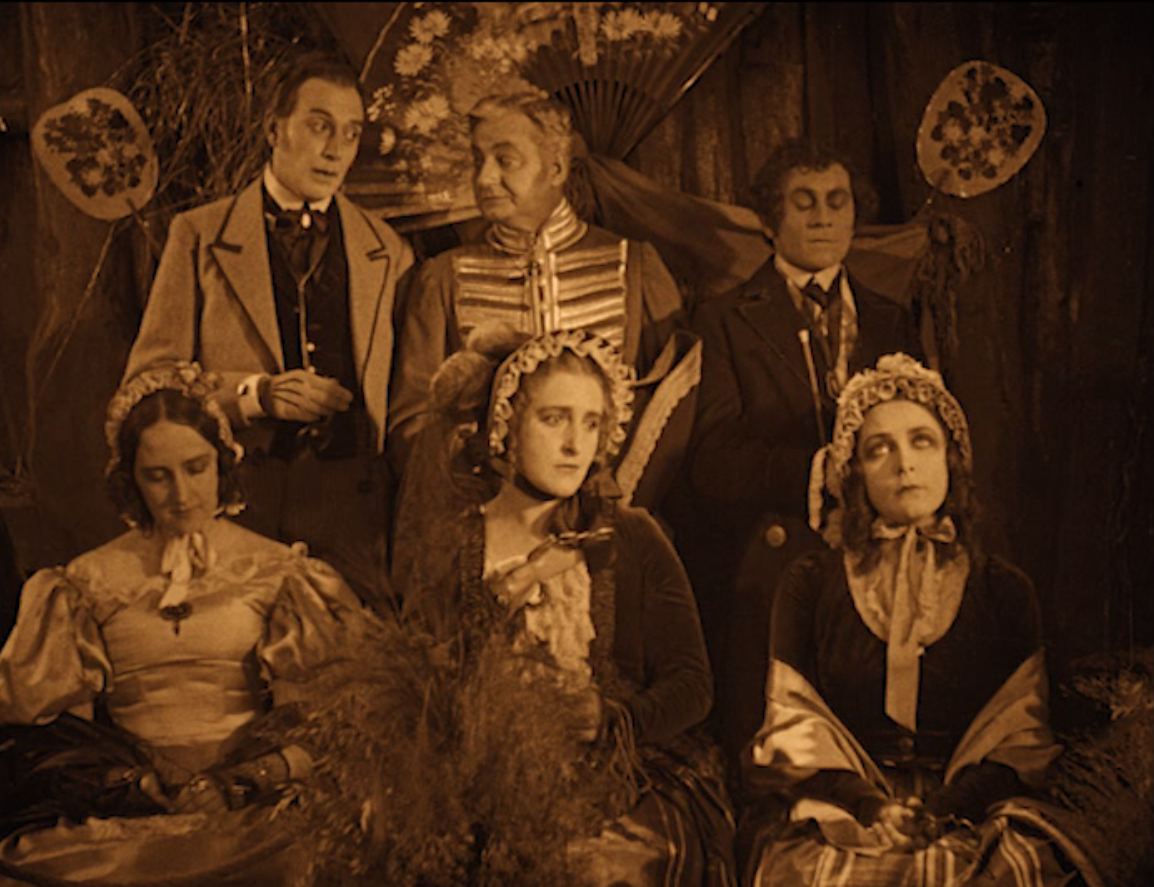
The royal guests at a performance of “Romeo and Juliette” with Erzherzogin Elisabeth Theresia (Henny Porten) in the middle. Photo: Screenshot from “Das alte Gesetzt,” 1923 / Deutsche Kinemathek
In this case, Mr. Deutsch is Baruch, son of Rabbi Mayer, and he has to deal with the advances of Henny Porten as her imperial highness Erzherzogin Elisabeth Theresia. Seeing their scenes together brings back memories of Emily Soldene’s reports about male stars in London productions of Hervé operettas, and the effect on the female audience.
Soldene describes C. D. Marius as Landry (the “masculine masher”) in Hervé’s Chilpèric: “Young and beautiful, and slender, and sleek, and sly and so elegant. […] He played Landry, and made love to Frédégonde or Brunehaut, he didn’t care which, with an ardour that was not only particularly French, but particularly pleasing and particularly successful, so successful indeed that every girl in the front of the house was seized with a wild desire to understudy those two erratic, not to say imprudent characters. He certainly looked awfully nice, his figure being perfection. And how clever he was! And how he managed what he was pleased to call ‘his voice’. It was not singing, but ‘he got there all the same’.”

C. D. Marius as Landry: the “masculine masher” in “Chilpèric.”
In Das alte Gesetzt, Baruch-as-Landry catches the eye of Erzherzogin Elisabeth Theresia by performing Romeo in a barn theater: with “Jewish locks.” (Which causes huge anti-semitic laughter.) Elisabeth Theresia immediately falls for the young man’s ‘acting talent’ and invites him to a midnight rendezvous at her castle, while her lady-in-waiting (Ruth Weyher) makes it clear that this is not the first time her highness has attempted to seduce men of the theater by offering to help them with their careers.
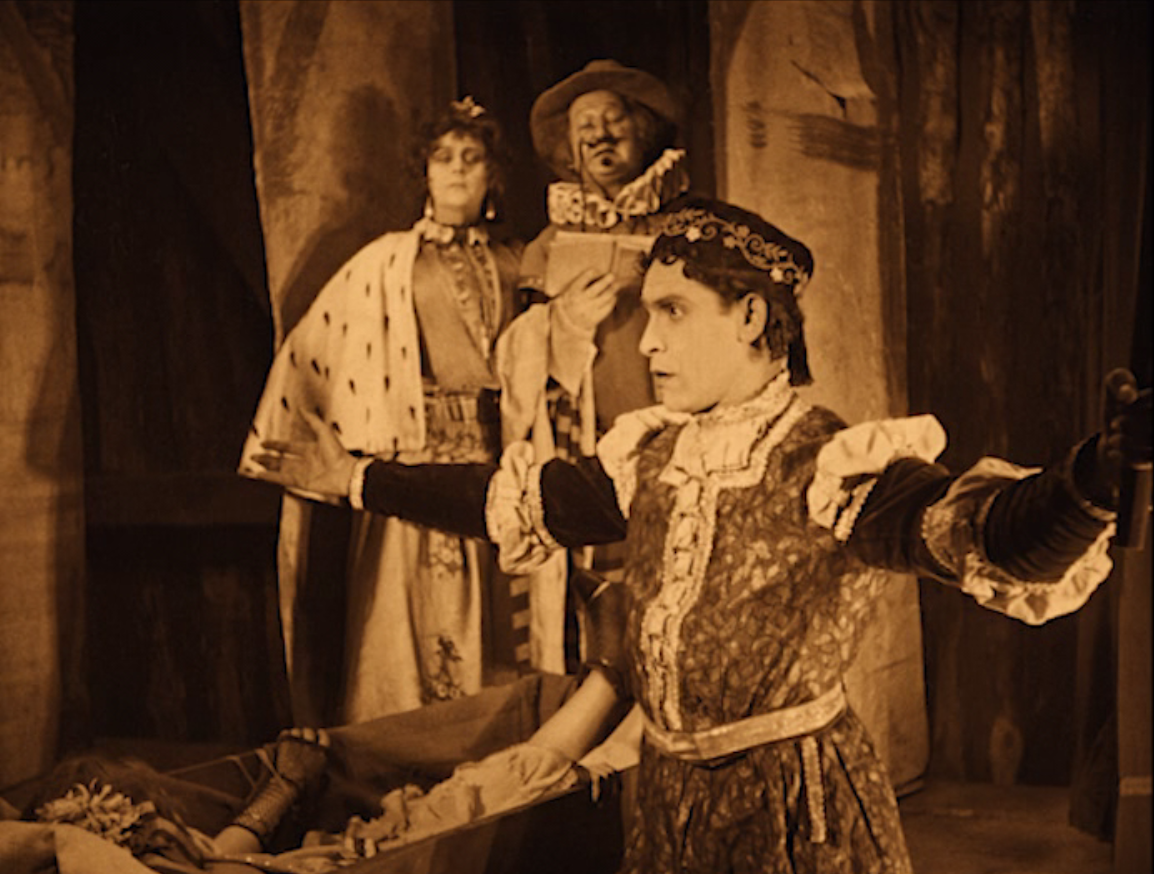
Ernst Deutsch playing Romeo in “Das alte Gesetzt,” 1923. (Screenshot / Deutsche Kinemathek)
Once Elisabeth Theresia’s protégé Baruch has established himself in Vienna as a star, he is invited to a grand ball. And who do we encounter there? Of course, Johann Strauss and his orchestra, a decade before he embarked on his operetta career. The man playing Strauss looks nothing like the real composer as documented in various photos and drawings, but the scenes are nevertheless fascinating in showing how society is divided.
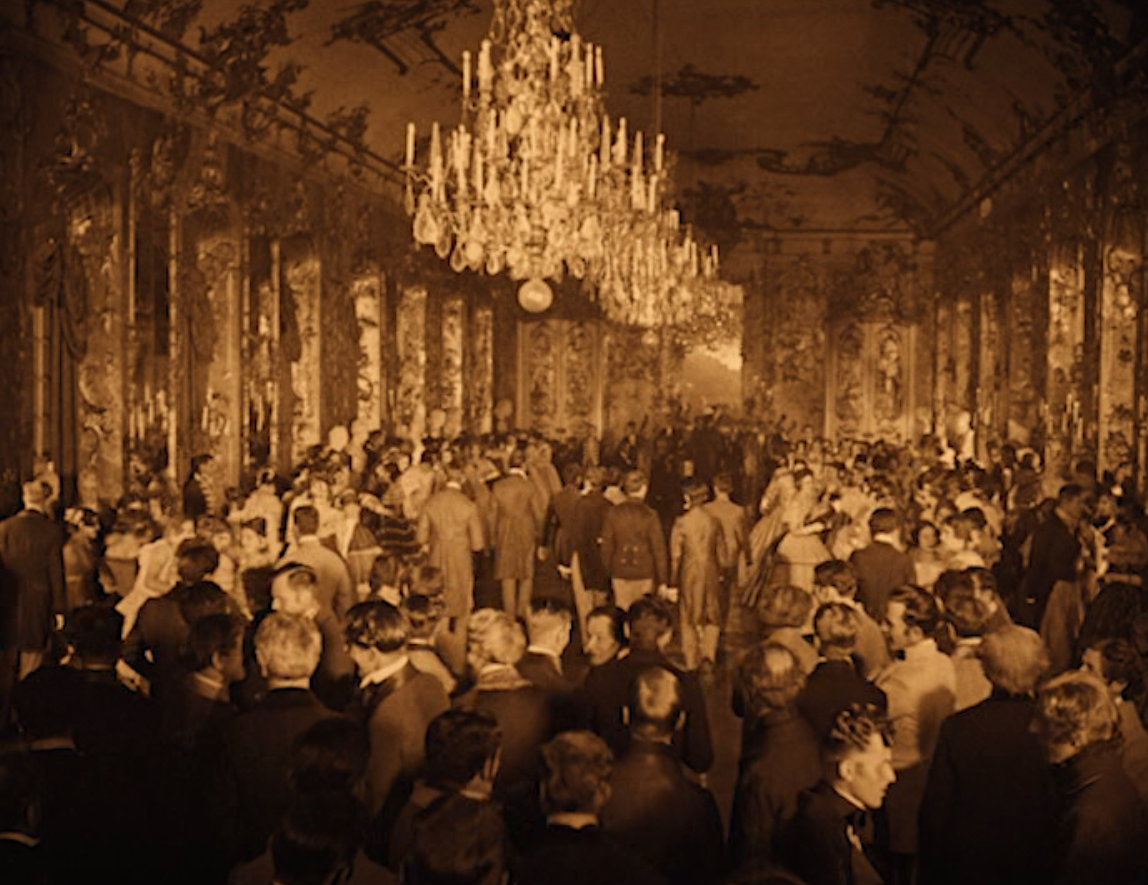
The grand ball scene in “Das alte Gesetzt” with the Johann Strauss orchestra playing in the background. (Screenshot / Deutsche Kinemathek)
While everyone may listen to Strauss’ glorious waltzes at the ball, not everyone is allowed into the inner circle of Elisabeth Theresia. She has to ask Baruch into the park – at midnight – to continue her seduction, and lose her fan in the grass. Which is found and brings a kind of father-figure to her house reminding her that such pursuits of unsuitable young men of the theater must stop before her reputation is compromised.
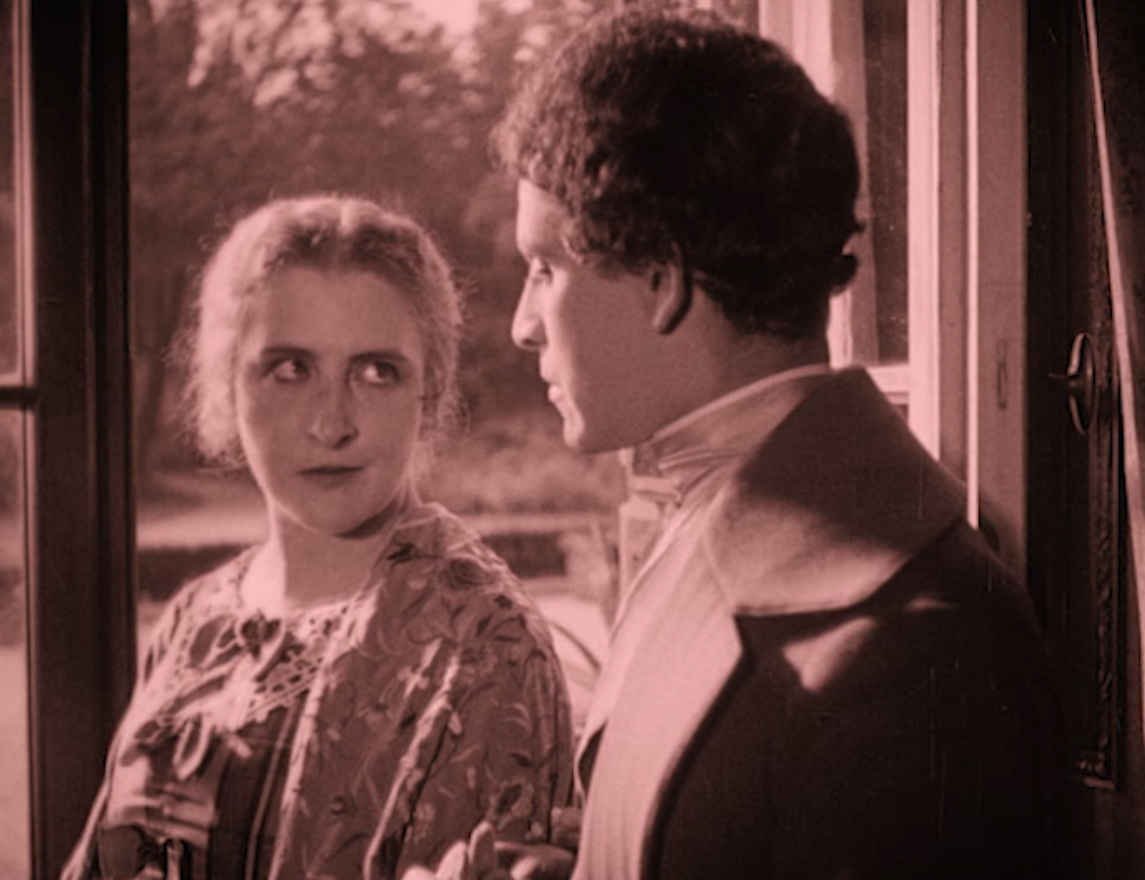
Erzherzogin Elisabeth Theresia (Henny Porten) trying to seduce Baruch, the rising actor (Ernst Deutsch) in “Das alte Gesetzt,” 1923. (Screenshot / Deutsche Kinemathek)
At the same time, two men from Elisabeth Theresia’s entourage go after the female star of the Romeo & Juliette barn-performance, inviting her for dinner. (In a scene very similar to Erich von Stroheim’s Merry Widow film from 1925.) In a chambre separée both gentlemen start hitting upon Alice Hechy as the object of their desire. And there, no one comes in to remind anyone of reputations. No one seems to care about such things. Because boys will be boys, but girls may not be girls (or Erzherzogins) without some father/uncle/teacher showing up and reminding them to behave properly?
But what about girls who behave ‘differently’? Miss Hechy freely gives away kisses to both suitors sitting at her table at the same time. It’s anyone’s guess what happens after dinner, most likely a tumultuous threesome. While the gentlemen will return to their high society positions without any problems, probably even bragging about the conquest to male society friends, the actress courted and fed so lavishly will return to her cheap caravan, with no prospect of ever being allowed to enter ‘polite’ society after such an escapade. Her two beaus will certainly not want to show themselves in public withher. What happens in and around the theater stays there, and it may not go any further.
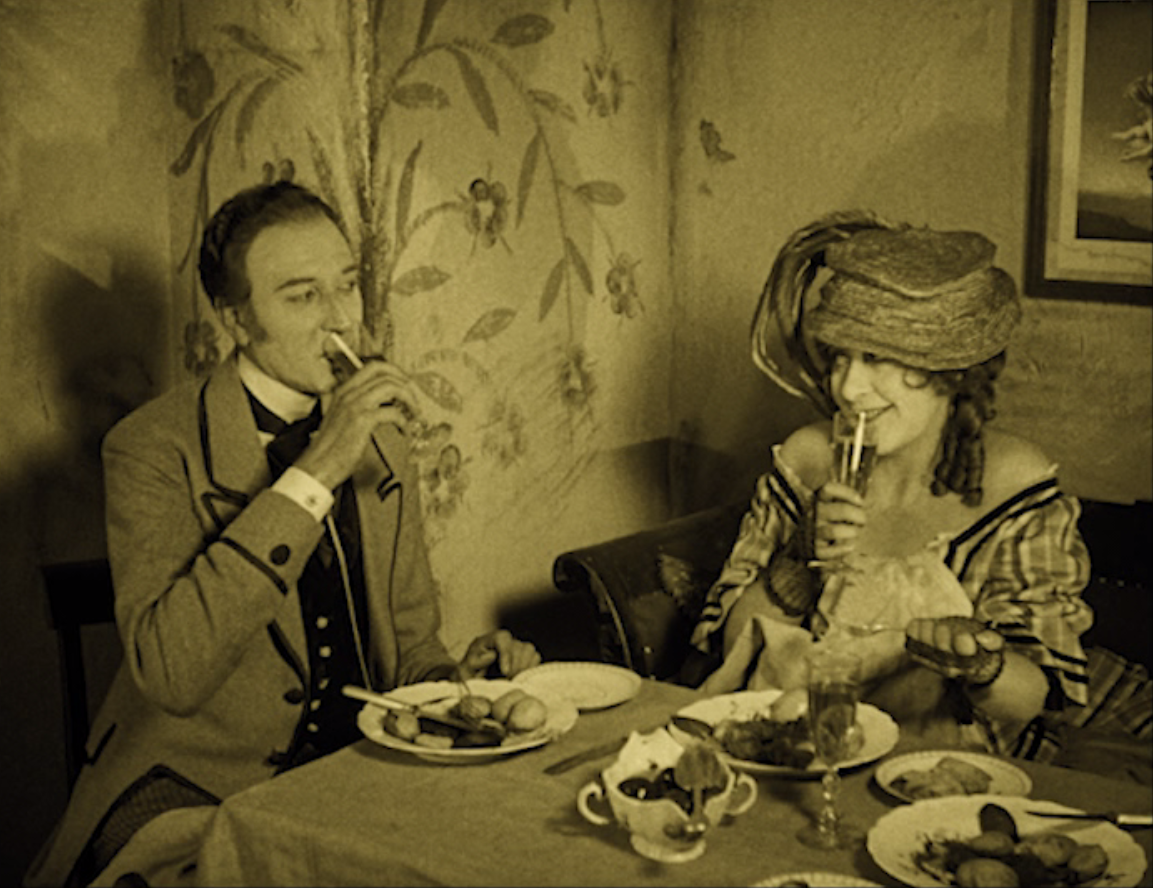
Alice Hechy as an actress in the provinces at a late night post-theater dinner with her royal admirers in “Das alte Gesetzt,” 1923. (Screenshot / Deutsche Kinemathek)
The way Alice Hechy is presented earlier in the movie – not just as Julia, but as Jeanne d’Arc in full armor – instantly brings back memories of Zola and his description of theater-as-brothel. Her costume is mostly designed to show off her bodily features: bare legs and breats.
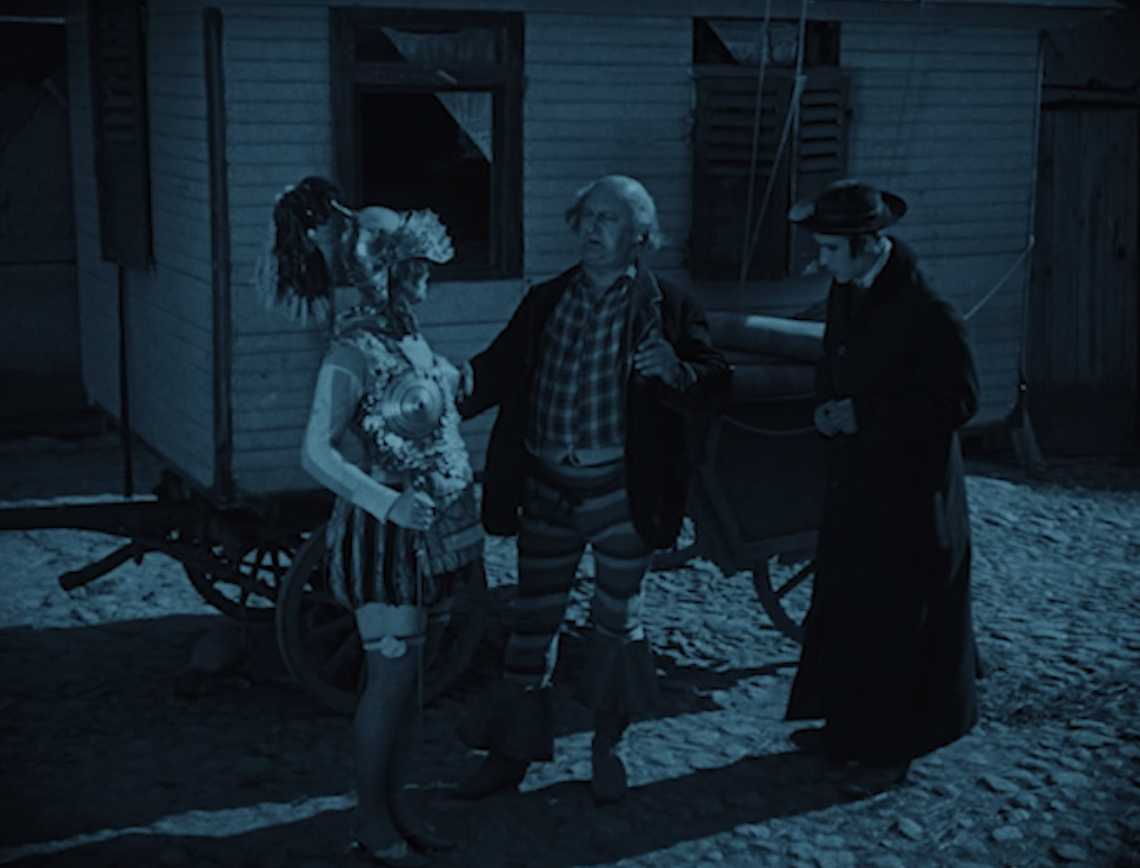
Alice Hechy in full armor as Jeanne d’Arc in “Das alte Gesetzt,” 1923. (Screenshot / Deutsche Kinemathek)
It also brings back memories of New York critics describing Offenbach’s Genevieve de Brabant in 1868 as “the most revolting mass of filth that has ever been shown on the boards of a respectable place of amusement in this city.” Seeing the theater-scenes in Das alte Gesetz makes such assessments understandable, they also make it clear that such “filth” was what people came to see at that-kind-of-theater, onstage and off. Happily paying to get in, in New York City 1868, and in the Habsburg provinces in the 1860s. (Which is the time Das alte Gesetz is set in.)
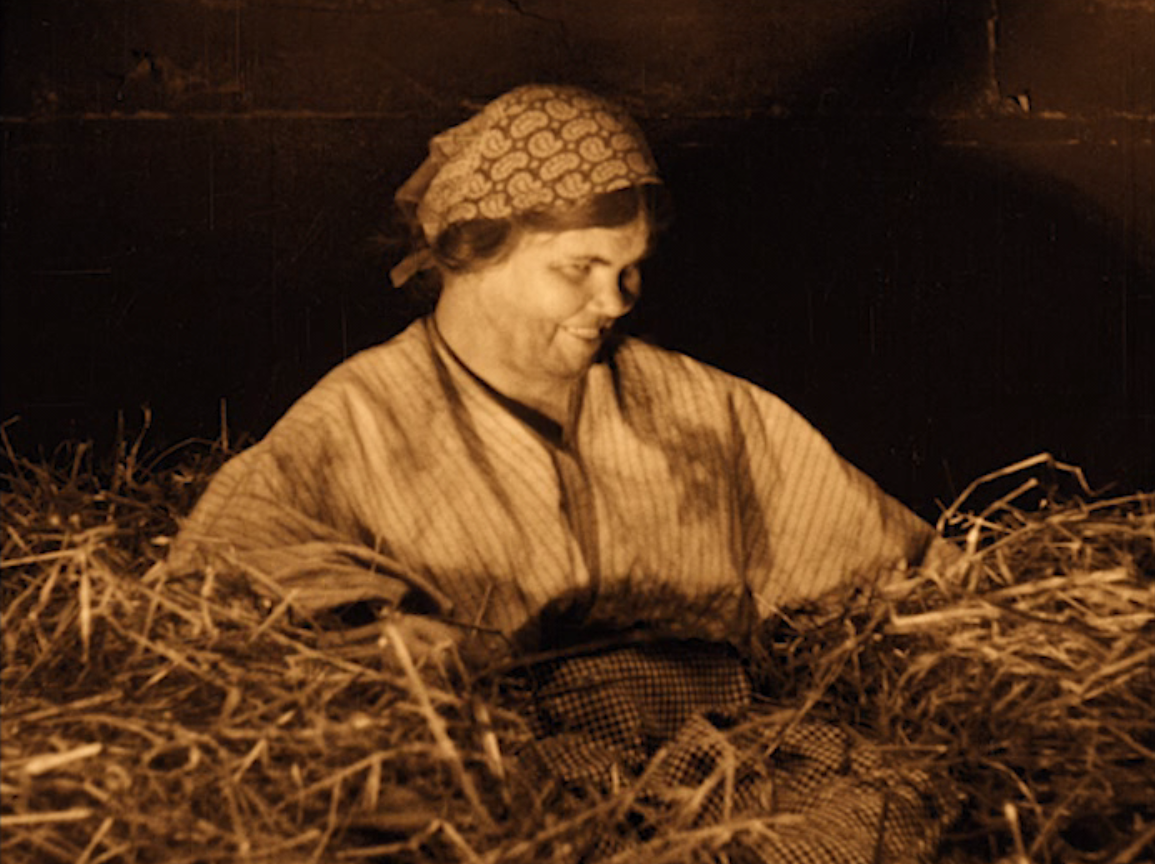
The inside of the theater in “Das alte Gesetz” where the audience is busy cruising during the performance. (Screenshot / Deutsche Kinemathek)
E. A. Dupont captures all of this with clarity, and the images are strikingly opulent, certainly in the new digitally restored version. They also allow a look at a Shtetl somewhere in Eastern Europe, with inhabitants that could be straight out of Fiddler on the Roof.
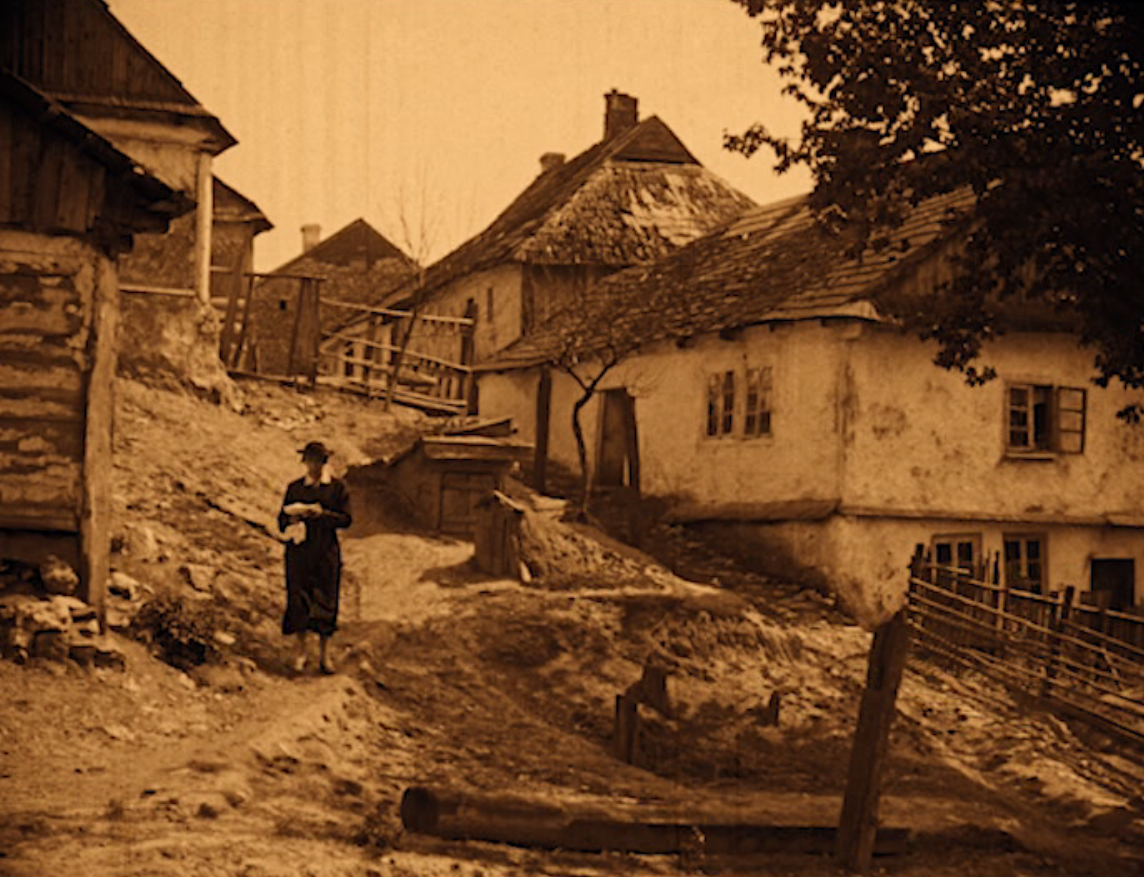
An anonymous Shtetl, as seen in “Das alte Gesetz” with Ernst Deutsch walking down the street. (Screenshot / Deutsche Kinemathek)
The story of the orthodox Rabbi and his son who becomes a theater star and has to leave his family and religious traditions behind is more reminiscent of The Jazz Singer (1927), however, especially because Grete Berger as the Rabbi’s wife is such a superb presence and makes the mother-son separation deeply touching.

A mother-son-moment in “Das alte Gesetzt” with Ernst Deutsch (l.) and Grete Berger. (Screenshot / Deutsche Kinemathek)
The new digital version is going on tour after the Berlinale premiere. It will be shown in various Eastern European cities that were once important Jewish centers, such as Vilnius, Budapest, Warsaw, and Munich. It will also be shown on TV at arte on February 19. After that, Das alte Gesetzt is available as a DVD (with English subtitles), though the glorious images certainly benefit from being seen on a large screen.
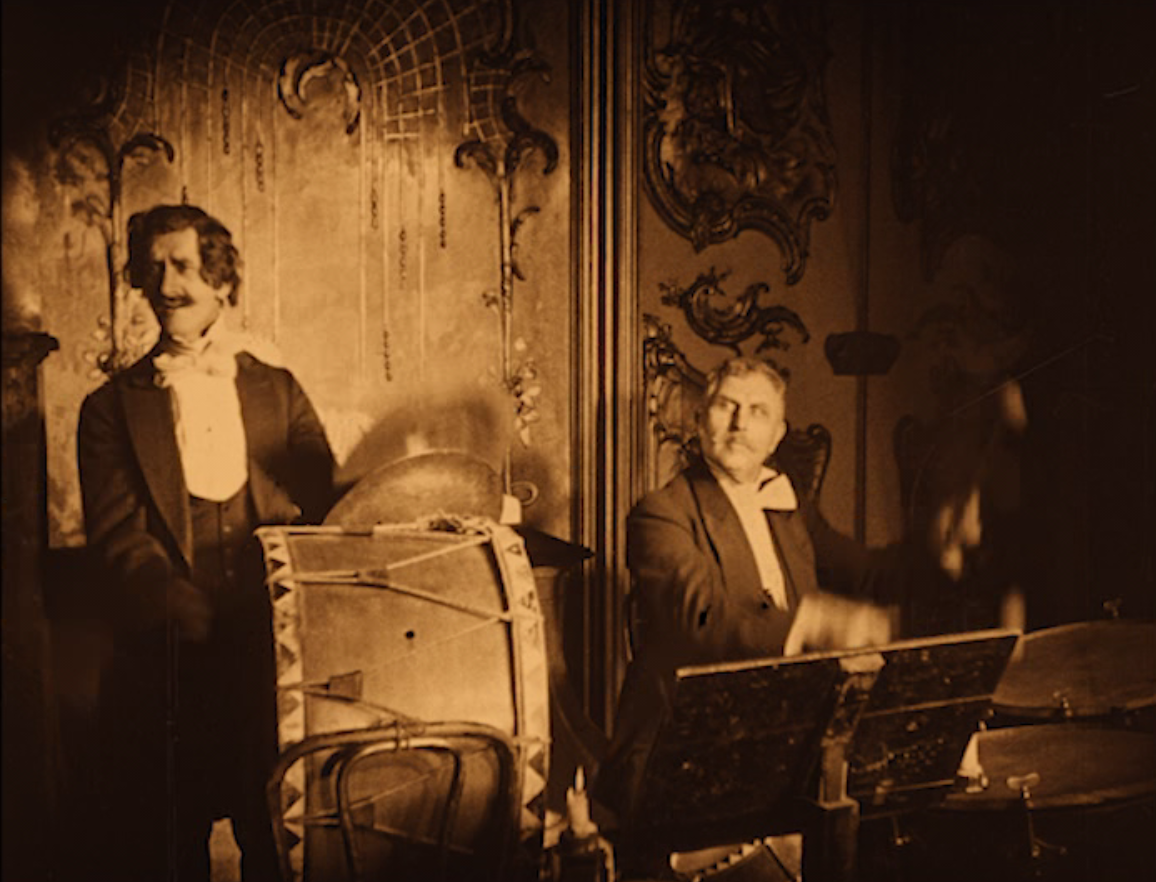
Members of the Johann Strauss orchestra as seen in “Das alte Gesetz,” 1923. (Screenshot / Deutsche Kinemathek)
Usually, I would say that silent movies also – always! – benefit from live music accompaniment. It seems the original score for Das alte Gesetzt is lost, so ZDF/arte asked French composer Philippe Schoeller to create a new soundtrack, which was performed (and recorded) by the Orchester Jakobsplatz München (OJM). This soundtrack, however, is so anti-atmospheric, reveling in random pseudo-modernistic sound clusters, that it almost destroys the effect of the movie restored by the Deutsche Kinemathek. There could have been many stylistic options for a novel soundtrack, and I personally have no particular preference, but what Mr. Schoeller has come up with is neither interesting in its own right, nor in combination with E.A. Dupont. And that’s a great shame. (Conductor Daniel Grossmann and the OJM still try their best to make it work.)
It seems that the distributors of the DVD realized this too. They offer a second soundtrack by pianist Donald Sosin and Klezmer violinist Alicia Svigals. All I can say about that alternative version is that it is marginally better than the Schoeller version. Neither captures the moods of the scenes – so beautifully colored and lit – and neither captures the glorious waltzing of the grand ball with the Strauss orchestra on screen. When you see the couples swirling around and the musicians giving their all, you will automatically hear the ‘right’ tunes in your head, but not in concert or on DVD.
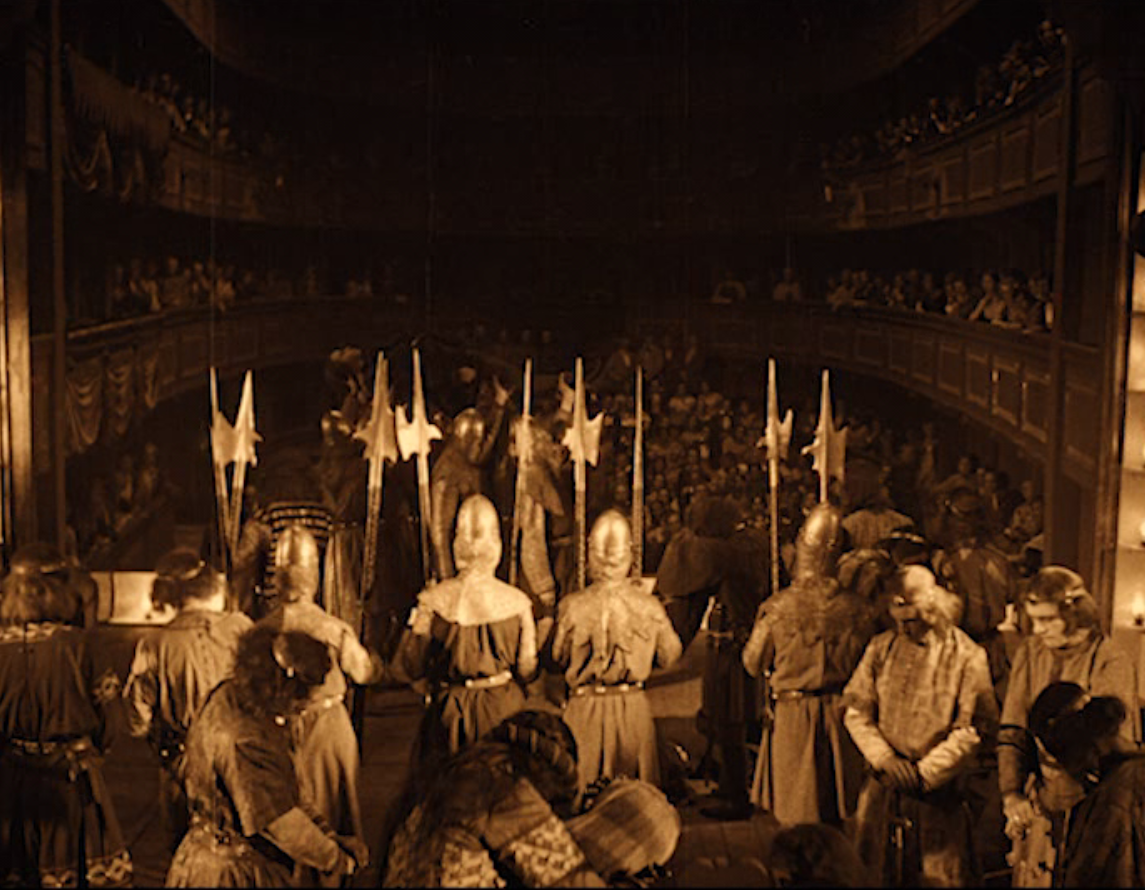
The final scene from “Hamlet” at the old Burgtheater, with Ernst Deutsch in the title role being carried away. From: “Das alte Gesetz,” 1923. (Screenshot / Deutsche Kinemathek)
Still, this is an important movie release, and the Deutsche Kinemathek and their partners have done a superb job in making this Weimar Republic film classic accessible again. The scenes set at the old Burgtheater – before the institution moved to its current house designed by Gottfried Semper in 1888 – are a must-see for anyone interested in theatre history. Ernst Deutsch, of course, is also a stand-out attraction, as is silent movie goddess Henny Porten whose Berlin villa is now a café which radiates old-style operetta charm.
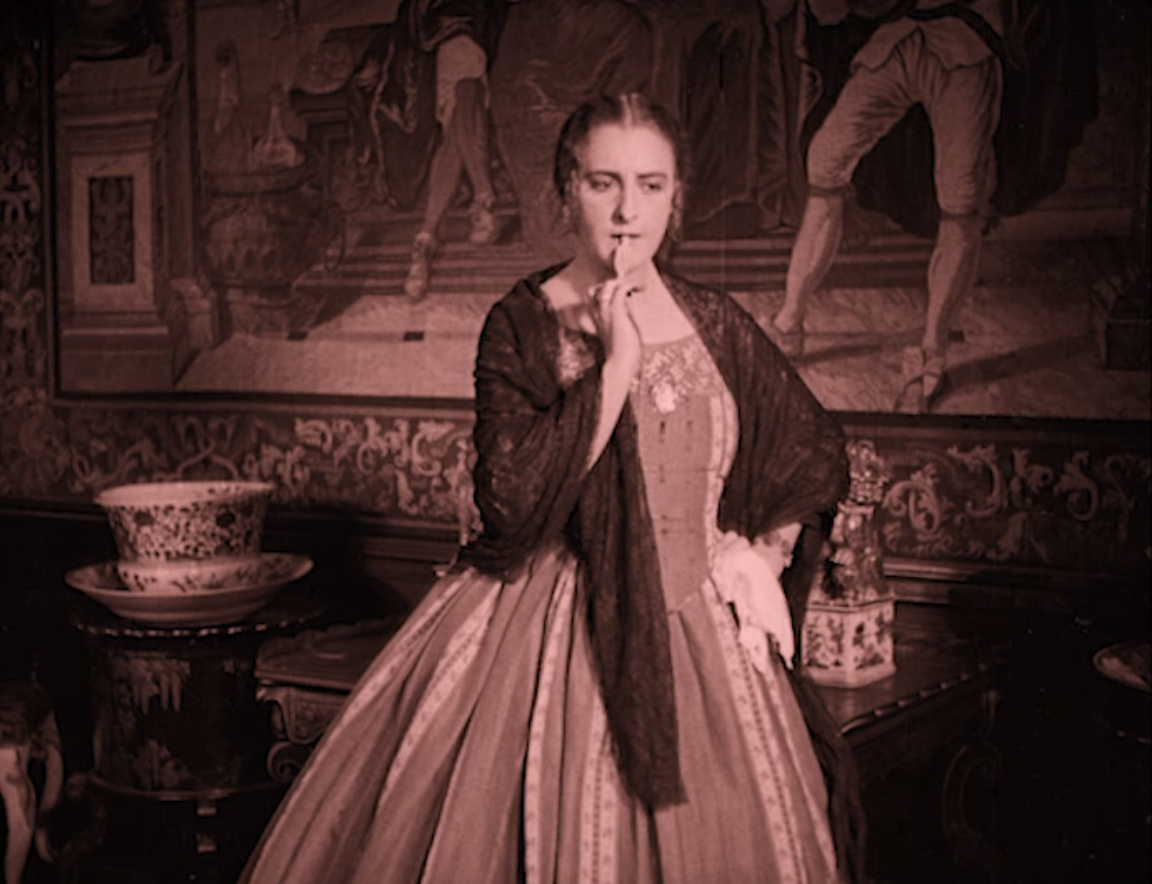
Henny Porten as the Erzherzogin trying to figure out how she can best seduce the actor Baruch in “Das alte Gesetz,” 1923. (Screenshot / Deutsche Kinemathek)
Meanwhile, the sociology of operetta remains a field that needs to be tackled by someone, hopefully soon. And a serious #metoo discussion in the context of operetta is overdue too, not just because Miklos Gabor Kerenyi from the Budapest Operetta Theater (better known as Kero) was fired recently as a result of sexual abuse accusations. (He made actors strip in his office, lie on his desk, and spanked them as punishment for ‘bad behavior.’) The case made headlines (click here for more information), and the firing of Kero in Budapest finally allows director György Lőrinczy to enter into a new artistic era, post-Kero. Lőrinczy is doing so with a production of Offenbach’s Barbe-bleue (1866): a show that is all about sexual violence and harassment. It’s directed by Kriszta Székely in a way that is most certainly beyond anything ever done by Kero. He, on the other hand, has found a new job at the operetta theater in St. Petersburg where spanking and undressing in the director’s office are apparently not seen as problematic. Need we say more?
For the live performances of Das alte Gesetz until April 2018 click here for details. For more details on the Budapest Bluebeard – with Károly Peller as Popolani and Attila Dolhai as Saphir – click here.
